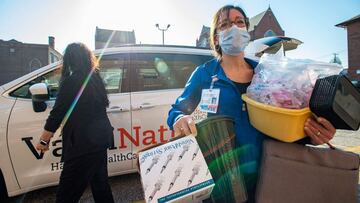Coronavirus US: Is it necessary to wear mask outdoors?
A total of 219 million Covid-19 vaccines have been administered in the US. Almost 27% of the population is now fully vaccinated so when can we stop wearing masks?

According to the most recent data issued by the Centers for Disease Control and Prevention (CDC), a total of 218,947,643 doses of Covid-19 vaccines have now been administered in the United States. Almost 27% of the adult population is fully vaccinated – 66% of those are aged 65 or over. New infection cases are also on a downward trend, with the seven-day moving average dipping for the tenth consecutive day. It begs the question, is the battle against coronavirus being won and if that is the case, when will we arrive at a point when wearing face masks, both indoors or outdoors, is no longer necessary?
Herpes zoster infections linked to covid-19 vaccine
Fourth stimulus check: who is in favor of its approval?
How many blood clots have been reported in the US after the vaccine?
CDC recommends the use of face masks
For the time being, the CDC is advocating that everyone over the age of two years should keep wearing face masks and continue sticking to social distance guidelines. They advise that masks should still be worn in addition to staying at least six feet apart, especially when indoors around people who don’t live in your household. And masks also need to be worn while travelling (plane, bus, train... etc.) both within the United States or on outward journeys, at airports and stations.
However, the CDC will be revising those guidelines with a view to easing Covid-19 restrictions and eventually no one will be expected to wear a face covering while out in the fresh air - although that might not happen for some time.
Yesterday, CDC Director Dr. Rochelle Walensky told Savannah Guthrie on NBC News’ Today programme, “There are numerous studies now that are starting to emerge that give us important data. We know that the vaccine is somewhere between 85-95% effective, and some of the questions are, does that mean that you’re not getting sick or you’re not getting the virus. The MMWR released data about a month ago that demonstrated that with screening, we are actually finding that people are not getting the virus at all. No vaccine is perfect and ultimately this is going to be a matter of risk, what I can say is that a 95% effective vaccine is extraordinarily effective. If we can have a 95% effective vaccine and we can get our caseloads down, then we’ll be in really good shape”.
As for the issue of wearing face masks out in the open air, Dr. Walensky added, “This is a question that we are looking at. One of the things I think is really important to understand is that while there is wonderful news and we are getting more and more people vaccinated every day, we still had 57,000 cases of Covid yesterday, we still had 733 deaths. We still have hot spots in this country and we will be looking at the outdoor mask question. But also in the context that we still have people who are dying of Covid”.
Related stories
It’s a cautious view, one which is shared by Director of the National Institute of Allergy and Infectious Diseases Dr. Anthony Fauci who suggested that there is a possibility that public health officials could continue to recommend wearing face masks well into next year.
Alaska’s testing and quarantine requirements for air travelers, started in June 2020, may have limited #COVID19 brought into the state and contributed to the state’s low case numbers last summer. Learn more: https://t.co/Sl5vW94N6E. pic.twitter.com/8JfeC2e6QX
— CDC (@CDCgov) April 22, 2021
Mask mandates in the US
Currently, 31 US states or territories have a mask mandate in place. These include: American Samoa, California, Colorado, Connecticut, Delaware, District of Columbia, Guam, Hawaii, Illinois, Kentucky, Louisiana, Maine, Maryland, Massachusetts, Michigan, Minnesota, Nevada, New Jersey, New Mexico, New York, North Carolina, Ohio, Oregon, Pennsylvania, Puerto Rico, Rhode Island, US Virgin Islands, Vermont, Virginia, Washington and West Virginia.

